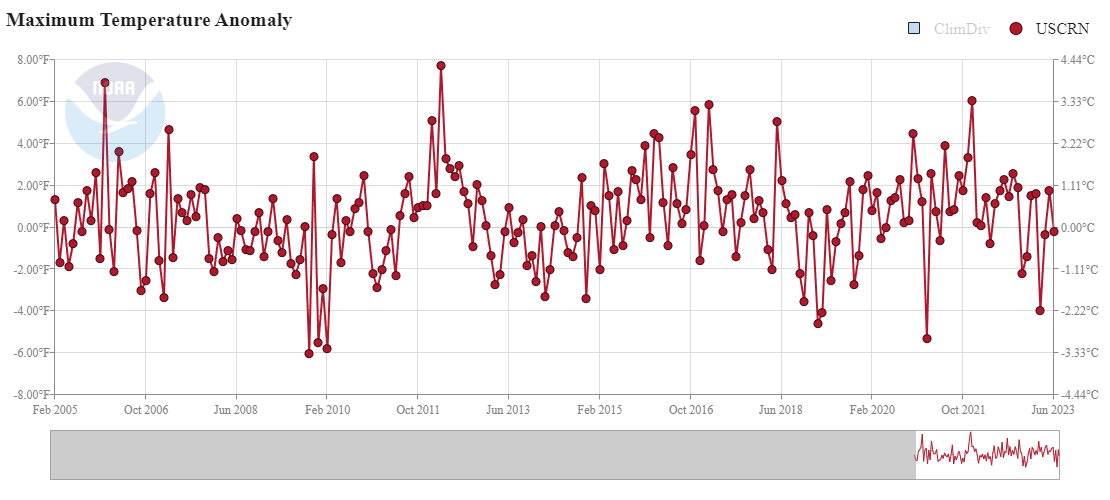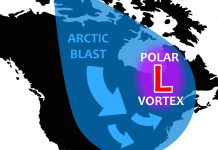The Hill recently posted an article about climate change, “There is no ‘new normal’: absent drastic action, the climate will only get worse,” claiming that without “drastic action,” weather extremes will continue to escalate because of the use of fossil fuels. This is false. Many of the examples the author, Andrew Pershing, uses in the post are erroneous at best. Weather is not getting more extreme, not even in the form of flooding or heat waves.
Pershing writes:
First, the extremes we are witnessing are not normal. Not normal in the sense that they are not natural. This summer’s heat domes and smoke waves are much more likely on a planet where people have been burning coal, oil, and natural gas for 150 years. Some of the events we’ve witnessed are so far beyond historical norms that they truly could not exist without climate change. This is especially true for the recent global temperature record, which isn’t likely to last long.
Pershing, vice president for science at Climate Central, a climate advocacy group, made a serious error when he references the recent “global temperature record” which comes from the University of Maine’s climate reanalyzer “visualization” site. As an apparent science expert, he should know better.
Climate Realism has debunked the claim that the July 4th week saw the highest temperatures on record, here, here, and here, but there is no need to take it from us.
The National Oceanic and Atmospheric Administration (NOAA) quickly put out a notice as the erroneous claim was going viral, stating that the reanalyzer is “not suitable” for the purpose of cataloguing real-world temperature. It is not an official NOAA product, and the University of Maine’s reanalyzer website itself put up a notice saying that it should not be considered an official observational record.
Pershing also references the recent heat in Texas, and flooding in Vermont, as examples of events that couldn’t happen without climate change, calling the conditions that led to these events “new.” This is also false.
Heat waves have not been increasing in intensity or frequency in the United States, according to the best and most accurate available data from NOAA– as shown through maximum temperature anomaly data from the Climate Reference Network. (See Figure below)

Texas is included in this estimate, and data from the Environmental Protection Agency shows that most of Texas has been seeing a decrease in the number of unusually hot days since 1948. Very few locations show a positive trend.
For Vermont’s flooding, Climate Realism recently posted an in-depth analysis, “The Dishonest Climate Fear-Mongering Headline of the Week Goes to @USATODAY,” which explains that according to Vermont historical records, “one of the most pervasive hazards that impinges upon and marks the Vermont landscape is flooding.”
It’s not, as Pershing says, the atmosphere’s water-holding capacity that makes Vermont more susceptible to extreme flooding. The state’s topography makes it so. Past storms, like the Great Flood of 1927, were similarly devastating.
After all, despite the increased precipitation in mid-latitude regions as discussed by the Intergovernmental Panel on Climate Change (IPCC) – there have been no detectible changes in the frequency or intensity of flooding events. It is equally as likely that flooding has been decreasing worldwide, as increasing.
Next in the post, Pershing makes the puzzling claim that weather averages “guide planning for things like roads, buildings or storm drains,” but that this technique no longer works for infrastructure planning because local climates are just so unpredictable.
This is simply nonsense. Roads have been washed out by floods, buildings destroyed, and entire towns submerged under ocean waves for as long as human civilization has built them. In regards to storm drains in particular, as cities are expanded, and more impermeable surfaces like concrete are laid down, water handling has to change. It has long been known that new development changes flood zones very rapidly, especially in areas that are already low-lying in flood plains, like Louisiana.
Pershing ends his article with a call to action, to stop burning fossil fuels, and to “bet on the trend” that weather must be getting worse and will continue to do so, telling readers to assume that “if something in the weather is changing or weird, then it’s probably related to climate change and probably going to occur more often.”
Weather data simply does not back this fearmongering claim up. As Climate Realism has pointed out numerous times (here, here, and here, for just a few!) weather like extreme rainfall, hurricanes, and tornadoes are not getting more frequent or severe. In some cases, like for strong tornadoes, data indicate there are fewer now than in the past, not more.
In a roundabout way, Pershing is right. There is no “normal”—climate change exists, as he admitted that it always has. Weather is difficult to predict with accuracy, and extreme weather can be dangerous. Where he’s wrong is his assertion that modern times are seeing unprecedented extreme weather, and that it has been getting worse with the modest warming of the past hundred or so years.


















Here in the UK we are having below July average temperatures,but you don’t hear about that in the media all we see on TV is Europe is on fire.Yes it’s a hot year for them but not the end of the world,just natural variability from what I can see the climate is used for
political reasons.The voices are very strong but if the earths temperature has gone up
1 centigrade so what is the climate really that sensitive?